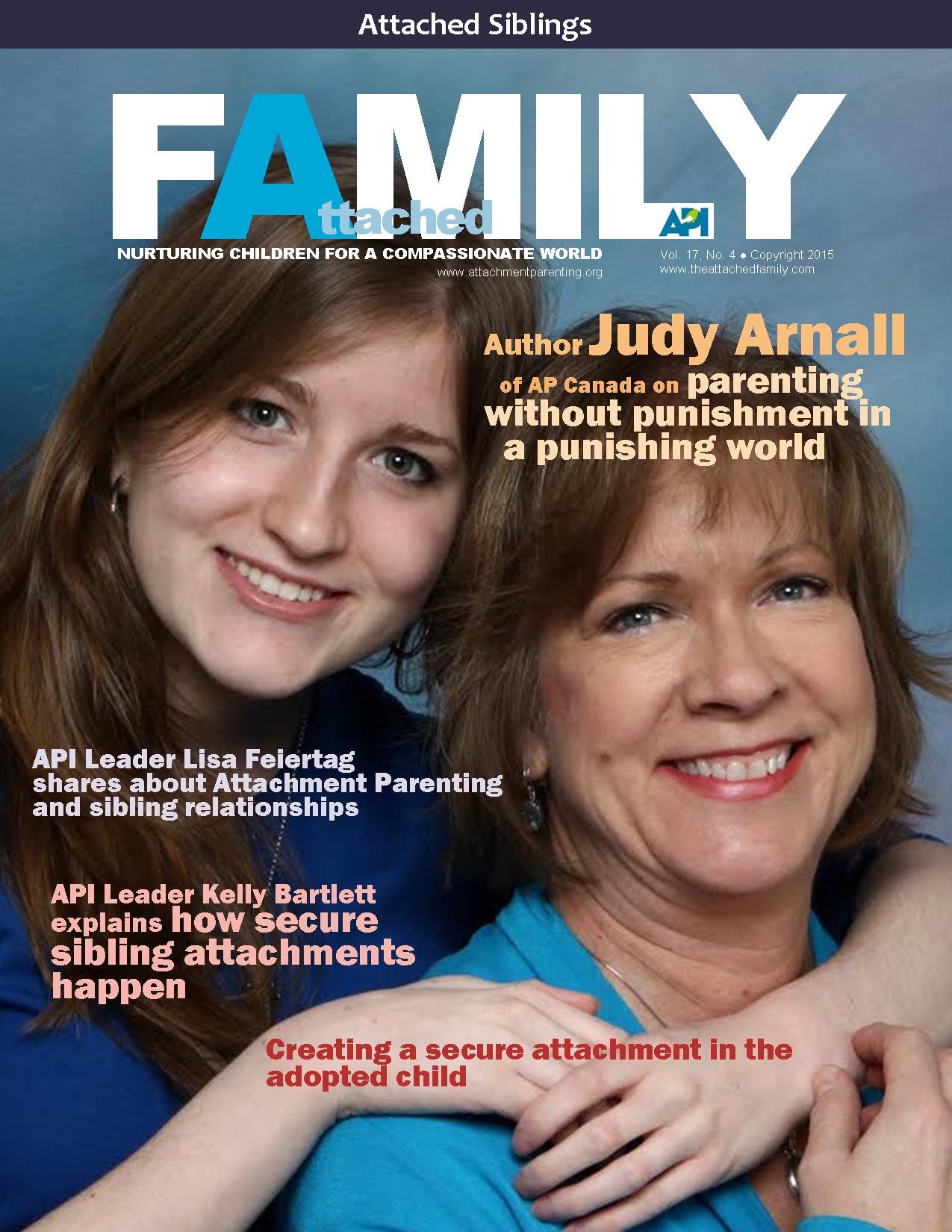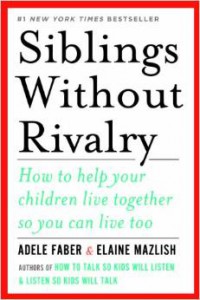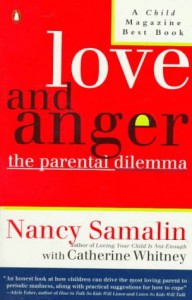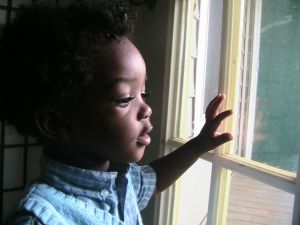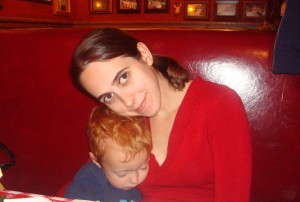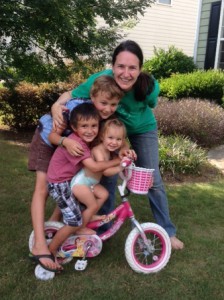Q: When my son hurts my daughter, I feel enraged, especially when he is grinning as though enjoying her pain. Still, I try to explain gently why he should not hurt his sister. Nothing helps. I would appreciate guidance on sibling rivalry.
 A: No matter how gently we tell a child not to hurt another, he cannot hear us. He can only hear that he is “not all right” with us and therefore not worthy of love. Feeling rejected, the child is then likely to lash out even more at his sibling, seeing her as the cause of losing parental love. Our disapproval reaffirms his worst fear that he has lost his place in our heart, and he has no control over his inner drive to act as he does. He may be bored, needing a sense of power through play, trying to get your attention in the best way he can or he may have a deeper anxiety associated with his sister. Whatever his inner drive, he needs you to see the validity of his need.
A: No matter how gently we tell a child not to hurt another, he cannot hear us. He can only hear that he is “not all right” with us and therefore not worthy of love. Feeling rejected, the child is then likely to lash out even more at his sibling, seeing her as the cause of losing parental love. Our disapproval reaffirms his worst fear that he has lost his place in our heart, and he has no control over his inner drive to act as he does. He may be bored, needing a sense of power through play, trying to get your attention in the best way he can or he may have a deeper anxiety associated with his sister. Whatever his inner drive, he needs you to see the validity of his need.
Siblings are often left to their own for too long and simply fail to get along. Social skills take years to develop. Considering that we adults have not mastered relationships yet, we may as well focus on improving ourselves, especially as we respond to children’s rivalry. Much of this kind of sibling rivalry can be prevented by setting up things in a way that is more supportive of children’s ability and needs.
Bring love, not justice.
When we take sides, admonishing one child and rescuing the other, we cause jealousy, animosity and future aggression. Turning our home into a courthouse, we lose the children’s trust. Instead of helping, we join and increase the struggle.
The child must feel safe to seek your help, knowing he will be cared for and not judged. It is not your job to teach justice. It is your job to love and to facilitate kind solutions that meet each child’s needs. Children who are treated with kindness and observe peaceful, non-judgmental solutions grow up to be kind and peaceful adults.
Instead of saying, “We don’t hit,” interrupt the hitting gently as you validate with, “I see you need to hit.” This creates instant connection and trust. These words do not endorse hitting but instead validate feelings, teaching kindness and compassion. Amazingly, you will also help yourself to shift from anger to care, and you will be able to focus on understanding the valid cause of your child’s action. You can then listen to each child without taking sides. They each have a valid reason for their actions.
If you take sides, children will learn this divisive technique from you and fight even more. If you judge, not only is your son hurt, but Little Sister is learning to see herself as a victim. If she hasn’t used this victim strategy yet, she soon will. She will provoke her brother so he will mistreat her, only to turn her parents against him. Unfortunately, she is also formulating the self-image of a victim. Meanwhile, the grin on the aggressor’s face is nothing but a cover-up for insecurity. He sees himself as failing to be worthy of your approval and is fearful of the “verdict.” His original action was a way of taking care of himself when not trusting that you would help him.
We don’t have to intervene if the children seem to resolve their struggles, and no one is hurt. But we want to prevent setups that tend to bring on rivalry. And we must be tuned-in, so when we are needed, we can show up promptly. Once we enter, we must not exacerbate the division but bring in connection and empathy.
An Example of Listening Without Taking Sides
Sierra grabs her brother’s pile of paper, so he cannot continue to draw. Theo runs after her. He catches her, but she throws the paper all over the place. He hits her. She cries. A parent arrives on the scene and is likely to see the boy as the aggressor.
Let’s look at a couple of peaceful ways to show up as a solution and not as a judge:
- You can notice the need and pick up the papers, handing them to Theo. Because Sierra tried to get her brother’s attention, you can offer to spend time with her.
No, this is not a reward but a kind response and a correction of your mistake when you did not notice her need sooner. There is no reason for guilt, just for correction. The problem is solved kindly and without useless analysis or futile lectures.
Both children’s needs are met. They are less likely to do any of it again, because it produced no parental “fireworks.” They now have a teacher of peace. The children learn that “who is wrong” is not the issue and that the worthy goal is a peaceful solution rather than a judgement. They learn to ask for your help rather than hit.
- If Sierra and Theo have already learned to seek justice rather than solutions, be the listener. Listen to the child who is bursting out with his story. Let the other child know that she will get her turn to talk.
Theo: “I was drawing, and she grabbed my papers.” Mom, validating the facts without drama: “You were drawing, and she grabbed your pile of paper and took it away?” Theo: “Yes, and I need it.” Mom, modeling responsibility and creating trust: “I understand. I am sorry I wasn’t here to help right away. Do call me next time, so I can help you.”
Meanwhile, Sierra wants to talk, too. If Theo is done, you can listen to her, assuring the boy that he will be able to talk again as much as he needs. Sierra: “He ran after me, and he hit me. I was going to give it back anyway.” Mom: “So you ran with the paper, and he ran after you and hit you?” Sierra, very satisfied: “Yes, he hit me. So what are you going to do?”
- At this point, it is tempting to go into a moral lesson: “If you do that, what do you expect? Why disturb your brother?” But then you are taking sides, and your child won’t trust you. She will not be able to discover her responsibility in the matter, because she will be too caught up in feeling hurt by your rejection. Your job is to understand and care for her, not to judge her. She will learn better when she comes to her own realization at this or another time. To be able to see her responsibility, she must be emotionally at peace, secure in your love. With a mind that cares, you too will be able to feel connected and learn how to prevent such struggles.
Mom: “I will spend time with you next time. Just ask. Lets do something together now.” Sierra: “Yes, but he shouldn’t hit me. Do something.” She is very intent on turning Mom into a weapon against her brother. Mom: “I will ask Theo to call me next time.” Sierra: “OK. But you won’t need to, because I won’t take his paper.” She comes on her own to notice her responsibility, without mom’s lecture. Mom: “Good. You will come to me when you need someone to be with.” Sierra, emphatically: “Yes.”
Theo may need to talk again, justifying the hitting. Theo: “If she didn’t take the paper, I wouldn’t have hit her. I had no choice.”
- This tells you that you have not been responsive fast enough when a need arose — which sometimes happens, as we can’t always meet children’s needs immediately — and your son concluded that he has to solve his own problems in his own immature way.
Mom, modeling responsibility: “Yes, I know. Next time I will pay more attention and be helpful faster. Will you call me?” Theo: “Yes, but she shouldn’t have grabbed the paper.” Again the child has learned to seek justice and to want to see his sister scolded or punished. Mom: “Yes, you are right. I wish I noticed that she needed attention. I will check more often and not get so deeply into my chores.” Theo: “I will call you if you don’t notice.” Mom: “Thank you, Theo. That would be helpful.”
It may not go so smooth, but no matter how long each child has to battle, keep listening and affirming his or her experience. There is never a need to judge, and no matter what a child says, his experience can be affirmed and understood. Your children will not only fight less, but will learn to feel compassion and to get along without winners and victims, seeking peace rather than justice.
Forgive yourself.
You may read this and feel regret or guilt for the way you have handled sibling struggles so far. You are not alone. These ways have been with us for generations. Guilt, however, comes from self-judgement. There is no judgement in finding out a better way. We learn something new, and we take new actions. If your flowers are wilting, you don’t feel guilty — you go water the flowers. Forgiveness, knowing you always did your best, is the compassionate default for all progress.

